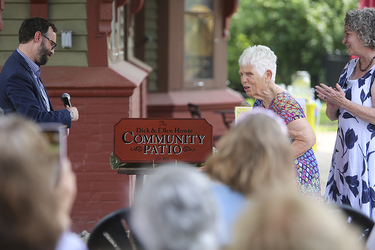Star Library on a ‘shoestring budget’ will investigate changing its status
GUILDERLAND — The Altamont Free Library has released its plan for the next three years, stressing, as is its tradition, “a few simple core ideas”: community, communication, and sustainability.
Joe Burke, the library’s director, presented the plan to the Guilderland Town Board at its Aug. 15 meeting, noting that for four of the past six years, the library has been nationally recognized by the Library Journal as a Star Library, a distinction shared by only 240 libraries in the United States.
“The number of libraries that have appeared on this list as often as we have is miniscule,” said Burke. “And we are very, very proud of that and we think you should be too, because that is strong evidence of the extraordinary quality of the programs and services that we are able to provide to the Guilderland community on a shoestring budget.”
The Altamont library has an annual budget of $189,000.
Burke said that “represents all of our expenditures from bond repayment and salaries to staples and stamps … For that, the Guilderland community gets 54 hours of library service per week on every day but Sunday.”
Unlike the Guilderland Public Library, which follows Guilderland school district lines, including Altamont, and has taxing power, the Altamont Free Library is an association library, which depends on town and village as well as state funds to run.
The library’s long-range plan for 2023-26 says its catchment area has about 5,000 residents, including the rural town of Knox, which has no library of its own, as well as the densely populated village of Altamont. Knox and Altamont as well as Guilderland contribute to the library.
Burke told the Guilderland board he would not be increasing his ask from the town for the upcoming budget year.
One of the items the long-range plan calls for is investigating the viability of its status as an association library. Burke said the library along with major community stakeholders will examine “whether we can better ensure our continued existence under a different organizational model, possibly as a special district library with independent taxing authority, possibly as a branch of the Guilderland Public Library, or possibly under some other organizational model.”
The Altamont library may, in the end, decide to stay as an association library, he said. “We make no assumptions about the outcome of this investigation,” Burke said.
The library, which was established in 1916, has been housed in the village’s historic train station since 2012.
The plan
“The Altamont Free Library community is a diverse one,” says the long-range plan, “containing a broad range of income levels, ethnicities, occupations, religious and political affiliations and interests … The characteristic that unites our members is an overwhelming sense of community-mindedness,” it says, stating that the renovation of the historic train station “is a clear expression of that sensibility, driven as it was by a large-scale grassroots effort over the course of many years.”
In putting together the long-range plan, the library, gathering information in the midst of the COVID-19 pandemic, surveyed patrons online and had meetings with community groups.
Deborah Marion-Katz, president of the library’s board of trustees, said the library held focus groups with parents and caregivers of young children, lunched with the Altamont Seniors, met with the entire fifth-grade class at Altamont Elementary School; surveyed homeschooling families, Hilltown residents, and young adults; and talked to residents and staff at Atlamont’s three group homes.
The planners also were led by Tim Burke, executive director of the Upper Hudson Library System, in a SWOT workshop to identify strengths, weaknesses, opportunities, and threats.
The report says, too, that a meeting was held with Matthew Pinchinat, former director of Diversity, Equity and Inclusion for the Guilderland schools, “who offered suggestions on fostering a more inclusive and collaborative library community and library offerings.”
The plan lists “perpetual steps” such as:
— To “more fully represent the diversity and lived-experiences of those in the community we serve”;
— To include “environmental responsibility, social equity, crisis preparedness, and economic/financial wellbeing” as part of training;
— To have emergency plans include dealing with natural disasters and other threats to the routine operation of the library facility and digital holdings as well as “plans for dealing with social-political and public relation challenges,” and crisis communications; and
— To “strive to reduce its consumption of energy, water and other non-renewable resources.”
The plan concludes with three goals, the first being to “expand upon and maintain a strong and sustainable financial position.” This includes the examination of its status as an association library.
The second goal is to “foster and expand strong community connections.”
This includes expanding and diversifying programs to be more inclusive, intergenerational, and accessible.
The library’s director and staff, for instance, will “study the most up-to-date literature on sensory-friendly and all-ability-friendly library programming.”
Marion-Katz told the board, “While we are small in physical location and small in staffing, we envision broadening our library reach and our programs through important community partnerships, potentially offering joint programs with Cornell Cooperative Extension, and utilizing community space such as the Altamont Masonic Temple for movie and game nights to engage our group-home residents.”
The plan’s third and final goal is to “seek new methods and improve existing methods of communication.”
Burke told the town board that the library wants to “foster deeper connections with community partners.”
He gave the example of a “groundbreaking summer reading buddies program” that pairs first-graders who are struggling to read with Guilderland High School students who have been trained as literacy coaches for weekly summer tutoring sessions.
Reading scores have improved for the kids who most need help, teens have become engaged with the library, and school reading specialists have a lighter load, Burke said. The program has increased its scope from six tutors to 22 this year and from 10 students to 40 students — and has been replicated in places as far flung as Long Island and Indiana, Burke said.
He had opened his comments by telling the town board that the library’s “meticulously maintained” historic building in the heart of the village “provides a bulwark for local property values.”
But, Burke went on, “Most importantly, you get a nationally recognized library whose primary mission is to educate, entertain and enrich, and empower the people of Guilderland. No matter their age, gender, income, or ethnicity, we welcome all and accept all. We might be the smallest library in Albany County, but we are a powerful force for good in the community.”
He concluded by telling the board he was “profoundly grateful” for the town’s support.
Supervisor Peter Barber said there is sometimes a “misperception” that the Altamont library is just for Altamont residents, not for residents who live elsewhere in Guilderland.
He said of his own two children, who did not grow up in Altamont, “They loved your library and they still do.”



